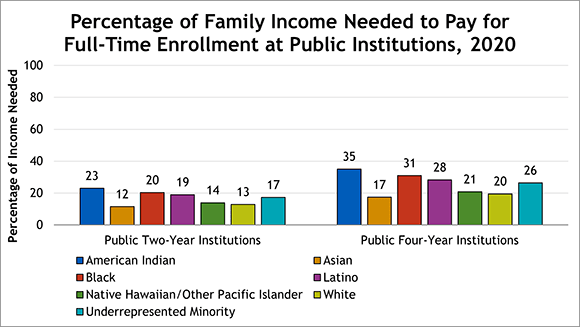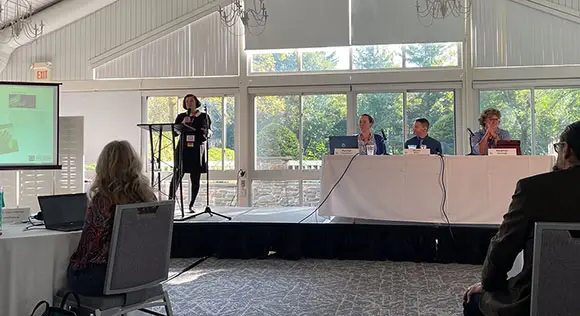MHEC News September 2023
Greetings,
We are pleased to share important news about college enrollment, MHEC Commissioner appointments, and upcoming programs and events. Highlights include:
Policy & Research: College Enrollment Remains Less Affordable for Underrepresented Students; HLC Deadline for Public Comment Closes 9/18; Negotiated Rulemaking and Impact to Reciprocity
Convenings: MHEC at EDUCAUSE; Course Marking at U.S. Colleges and Universities
Programs: Proposed SARA Policy Modifications
Commissioner News: Minnesota appointments As always, the Compact welcomes your feedback and suggestions
Policy & Research
College Enrollment Remains Less Affordable for Underrepresented Students
The latest update to MHEC’s Interactive Dashboard shows that attendance at public two- and four-year institutions in the Midwest requires a greater share of family income for Underrepresented Minority students (comprised of American Indians, Latinos, and Native Hawaiians/other Pacific Islanders), compared to Asian and White students. On average, public two-year college attendance in the Midwest requires 17 percent of family income for Underrepresented Minority students, compared to 13 percent of income for White students. Public four-year college attendance in the Midwest requires 26 percent of family income for Underrepresented Minority students, compared to 20 percent of income for White students. Underrepresented students are disproportionately represented among lower-income students. Similar differences in college affordability are seen across the nation.
The ability to pay for college is measured by the percentage of family income needed to pay the net price of full-time enrollment at public two- and four- year institutions. The average net price is calculated as the total cost of attendance (tuition and fees, books, supplies, and room and board) minus the average institutional, local, state, and federal grant aid. This indicator utilizes median income for families with children under 18 years old within each racial and ethnic group. MHEC’s Interactive Dashboard provides additional ways to visualize this data using bar charts, line graphs, maps, and tables. Selected participation indicators are also available for MHEC states in the report Higher Education in Focus.

Public Comment on Higher Learning Commission’s Proposed Faculty Qualifications Policy Changes Closes September 18
The Higher Learning Commission (HLC) Board of Trustees issued proposed policy changes related to faculty qualifications. The proposed policy assigns responsibility to institutions for establishing and maintaining reasonable processes for determining instructor qualifications. In addition, the proposed policy allows instructors to be qualified based on a “variety of factors, including, but not limited to, academic credentials, progress toward academic credentials, equivalent experience, or some combination thereof.” New proposed policy language was distributed in July 2023, with an invitation for public comment and questions to be submitted to HLC by September 18. The HLC Board will vote on the proposed changes at its meeting November 2-3.
Negotiated Rulemaking and Impact to Reciprocity
MHEC is monitoring the certification procedures that could impact reciprocity in negotiated rulemaking. One of five proposed topics in the May federal regulations — gainful employment — has moved forward with rules sent to the Office of Information and Regulatory Affairs in the Office of Management and Budget for regulatory review before they can be released as final.
In general, these rules focus on institutions and programs eligible under the Higher Education Act. Included are regulations that determine whether postsecondary educational programs prepare students for gainful employment in recognized occupations and the conditions for which programs remain eligible for student financial aid.
The recent WCET Frontiers post asks the Department of Education to consider a delay of the effective date, if they are to become final by November 1, so that state licensing boards and state authorizing agencies have adequate time to prepare for their role related to new federal regulations. To read more about the Notice of Proposed Rulemaking visit the SAN website.
Convenings
MHEC’s Technologies Community Hosts Breakfast During EDUCAUSE 2023
MHEC’s Technologies Community will host a breakfast on October 10 at the EDUCAUSE Annual Conference in Chicago. Attendees from institutions across the Midwest region are invited to begin their EDUCAUSE conference experience with this regional networking session. Attendees do not have to be current participants of MHEC’s Technologies Community. Learn more about MHEC’s Technologies Community and the associated technology contract portfolio. For more information contact Deb Kidwell, director of technology initiatives.
Resources Available from Past Events
Course Marking at U.S. Colleges and Universities Resources are available from the Southern Regional Education Board’s Summer Webinar Series featuring Course Marking at U.S. Colleges and Universities. MHEC conducted a national landscape analysis to better understand how course marking related to Open Educational Resources (OER) is being conducted at U.S.-based colleges and universities. This collaborative work of the National Consortium of Open Educational Resources (NCOER) includes data related to institutions’ course marking processes, data validation processes, use of course marking data, technology use, and motivations for course marking of OER.
Programs
Proposed SARA Policy Modifications Results Shared
Six proposed policy modifications for the National Council of State Authorization Reciprocity Agreements (NC-SARA) were approved by the four regional compacts. Rationales for each proposal are available on the NC-SARA website. The review and voting processes were accomplished through each SARA Regional Steering Committee. These policy proposals will be on the agenda for the October 23 NC-SARA board meeting for review and vote.
Registration is now open for the public session of this meeting. This vote is the final step in the policy modification process.
Commissioner Appointments
Minnesota
Rachel Croson
Executive Vice President and Provost
University of Minnesota
Term: 9/1/2023 to 1/6/2025
Scott Olson
Chancellor
Minnesota State
Term: 9/1/2023 to 1/6/2025
Team Updates
NC-SARA State Portal Entity Annual Conference
Sara Appel, director of M-SARA, moderated a panel at the NC-SARA State Portal Entity (SPE) Annual Conference in Essex, Vermont, September 13-14. Panelists concentrated on NC-SARA’s process for reviewing and responding to student complaints, which is one form of student consumer protection. This session focuses on the NC-SARA complaint dashboard which is currently undergoing a restructuring. SPE representatives shared how they process these grievances and discussed the need for potential SARA policy changes around consumer protections to meet the demands of today’s students. Susan Heegaard, president, also participated in this meeting.

Student Success Summit
Aaron Horn, associate vice president of research, and Shaun Williams-Wyche, associate director of research and data analysis, attended the Southern Regional Education Board Student Success Summit on September 13-15.
Technology and Procurement Events
Nathan Sorensen, director of government contracts, will attend the
Internet2 Technology Exchange on September 18-22, and NAEP Great Plains Annual Fall Conference on September 24-27.
Articles and Resources of Interest
Federal Playbook
College in High School Alliance | September 2023
OER Preconference Workshop for Academic Libraries
Book Marks – South Dakota Library Association | July/August/September 2023
MHEC mentioned on page 4.
How the FAFSA delay could impact colleges and students
Higher Ed Dive | August 28, 2023
Distance Education and Workforce Development Reports
NC-SARA | August 2023
State Approaches to Federal Stimulus Funding for Higher Education
SHEEO | August 17, 2023
Promote Cybersecurity Career Discovery
NICE Community Coordinating Council | May 2023
MHEC’s Midwest Credit Transparency Alliance mentioned on page 20.
